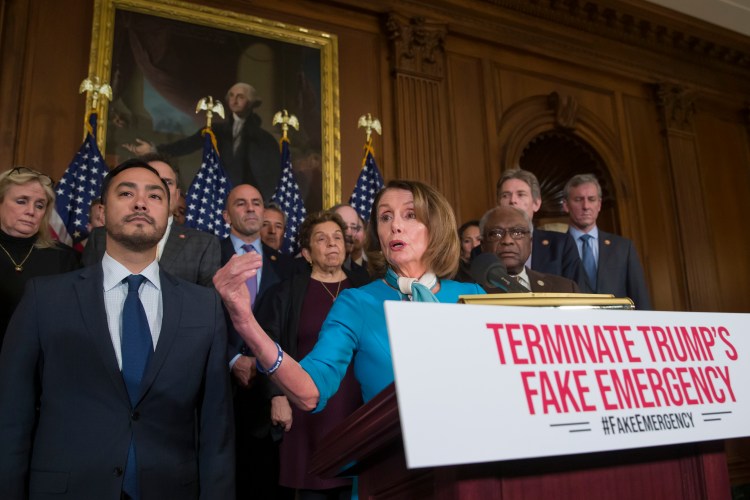WASHINGTON — The House on Tuesday passed a resolution to overturn President Trump’s declaration of a national emergency on the southern border as majority Democrats painted an apocalyptic portrait of a lawless chief executive who is out to gut the Constitution.
The 245-182 tally was mostly along party lines, with 13 Republicans defecting to side with Democrats on a vote that effectively became a test of Republican loyalty to Trump. Despite their frequent complaints of executive overreach during President Obama’s administration, most Republicans fell in line with Trump’s decision to try to circumvent Congress to get billions of dollars for his border wall. As a result, the vote fell well short of the two-thirds majority that would be required to overcome Trump’s threatened veto.
Democrats argued that Trump’s claim of a crisis at the border was baseless, and that he was embarking on the road to dictatorship by unilaterally declaring an emergency to try to get money from U.S. taxpayers to fulfill an unpopular campaign promise.
“We are not going to give any president, Democratic or Republican, a blank check to shred the Constitution of the United States,” House Speaker Nancy Pelosi, D-Calif., said on the floor before the vote. Holding up a pocket copy of the Constitution, she asked Republicans: “Is your oath of office to Donald Trump, or is your oath of office to the Constitution of the United States?”
Both of Maine’s representatives, Democrats Chellie Pingree and Jared Golden, voted in favor.
Pingree said in a statement that Trump had fabricated an emergency and set a dangerous and unconstitutional precedent by bypassing Congress.
“It’s particularly concerning that the President has given himself the authority to take money away from critical military construction projects already approved by Congress, including four multi-million dollar projects at Portsmouth Naval Shipyard,” Pingree said.
Republicans countered that Democrats were ignoring a very real crisis at the border, and said Trump was within his rights to declare a national emergency, since he was acting under provisions of a law passed by Congress, the National Emergencies Act of 1976. Tuesday’s vote was the first time since passage of the law that the House has invoked provisions allowing for passage of a disapproval resolution to nullify a presidential emergency declaration.
“There is a national emergency at the southern border that the Democrats will declare today doesn’t exist,” said House Minority Leader Kevin McCarthy, R-Calif. “The president has the authority to do it, and we will uphold him.”
Trump issued the emergency declaration on Feb. 15 as part of a deal to keep the government open after a 35-day partial shutdown over Christmas and much of January. The president agreed to sign a spending bill to keep the government funded through Sept. 30 while providing $1.375 billion for 55 miles of fencing along the border in Texas, but he said he needed billions more. The administration plans to redirect an additional $6.7 billion from several sources, including $3.6 billion from military construction projects that can be accessed via the emergency declaration.
Trump long claimed Mexico would pay for the wall.
Now that the House has passed the disapproval resolution, the Senate will have about 18 days to take it up, a timeline set by the National Emergencies Act. The law also specifies that Senate passage takes only a simple majority, not the 60-vote supermajority often required in the Senate.
That means four Republican votes would ensure passage of the disapproval resolution – presuming that Democrats stick together as expected. Republican Sens. Susan Collins of Maine, Lisa Murkowski of Alaska and Thom Tillis of North Carolina have announced plans to vote for the disapproval resolution, and other Republicans have been voicing concerns, including inside a closed-door lunch Tuesday with Vice President Mike Pence, during which about six senators spoke up with reservations, according to one person in attendance.
One of those senators was Sen. Ted Cruz, R-Texas, who asked a Justice Department attorney about how a future Democratic president might be able to use similar emergency powers, according to an official briefed on the meeting, who requested anonymity to describe it.
Senators called it a “serious” discussion with Pence, one in which the vice president focused on trying to explain the rationale for the emergency declaration and mollify concerns from rank-and-file Republicans that the reprogrammed funds would not hurt their local military installations. The vice president made the case that the wall was the issue Trump ran on in his campaign, and he argued that military construction projects would not be jeopardized, because the money could be replaced, according to the official briefed on the meeting.
“Let me tell you this, if it’s military construction projects, we’ll back-fill that so fast, as soon as we get there,” said Sen. Richard Shelby, R-Ala., chairman of the Appropriations Committee, predicting “no trouble” in providing news funds for the projects. “You can rest assured that issue won’t stay alive long.”
Shelby dismissed any concerns about where those funds would come from to replenish the military accounts.
“From money! Where do we fill everything else? Because it would be one of the highest priorities,” Shelby said.
A White House document for media said Tuesday that the military construction funds under the national emergency declaration would be tapped only after the appropriated money and other funding sources have been exhausted, sequencing that some Republicans have pointed to as alleviating some of their concerns. The military construction funds would come from projects like military housing and a variety of improvements at bases around the country and internationally, in situations where money has been appropriated by Congress but not yet obligated.
The Washington Post’s Paul Sonne and Mike DeBonis contributed to this report.
Send questions/comments to the editors.


